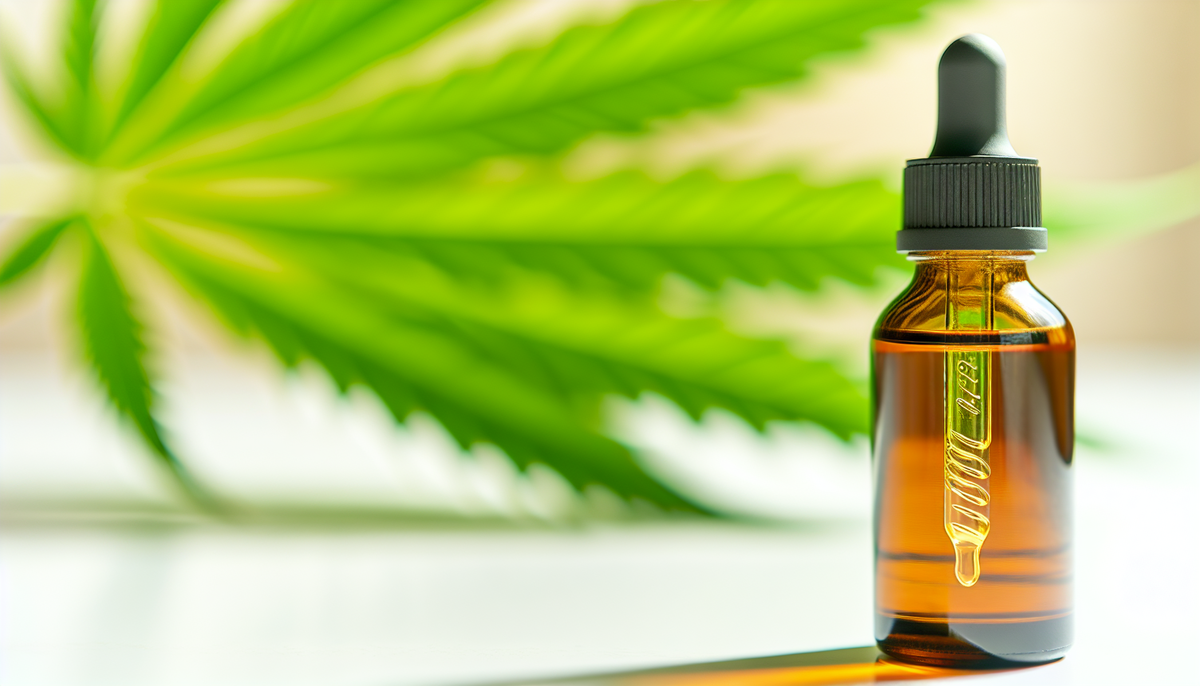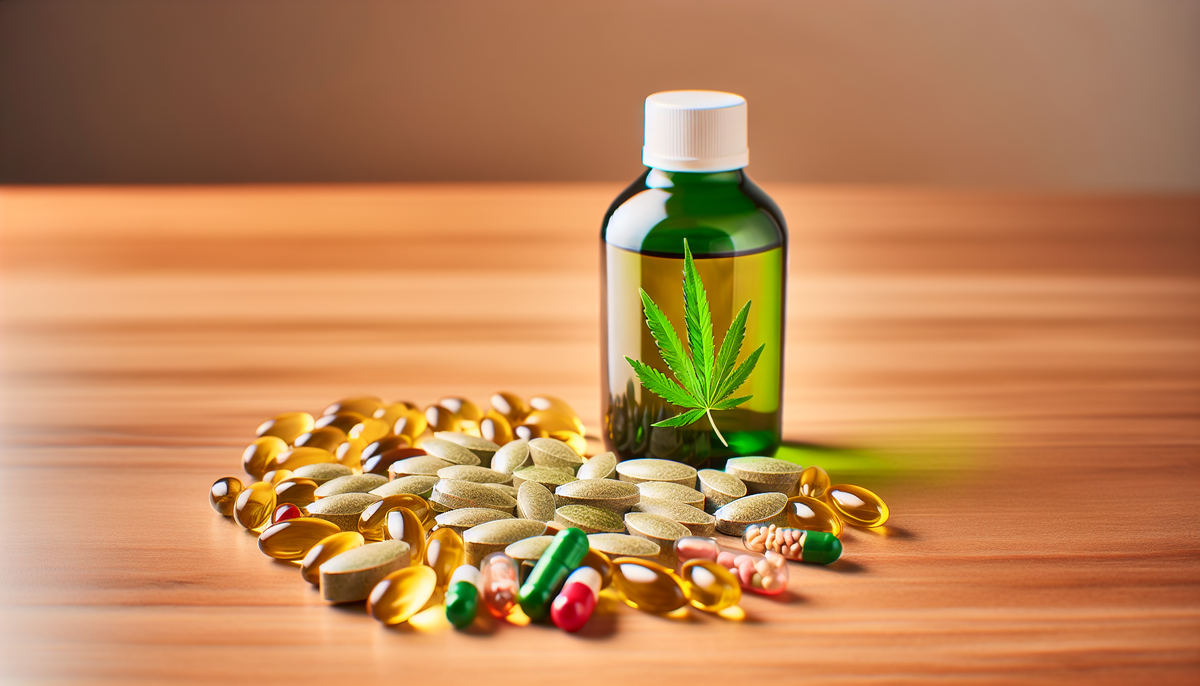Can Hemp Oil Get You High? Separating Facts from Myths
Written by: Hunter Podell, Subject Matter Expert and Website Founder
Published: March 15, 2024; Last updated: April 6, 2024
- 1. Key Takeaways
- 2. Understanding Hemp Oil: Origins and Composition
- 2.1 The Cannabis Family Tree
- 2.2 Essential Components of Hemp Seed Oil
- 3. Debunking the High: Hemp Oil vs. Psychoactive Effects
- 4. Hemp Oil in Your Daily Life: Safe Uses and Applications
- 4.1 Culinary and Nutritional Benefits
- 4.2 Skincare and Cosmetic Use
- 5. The Legality and Regulation of Hemp Products
- 6. Comparative Analysis: Hemp Seed Oil vs. CBD Oil
- 6.1 Extraction and Production Processes
- 6.2 Potential Health Claims and Research
- 7. Myths and Misconceptions: Clearing Up Confusion
- 8. Hemp Oil’s Impact on Overall Wellness
- 9. Summary
- 10. Frequently Asked Questions
- 10.1 Can hemp oil make it high?
- 10.2 Does hemp cause euphoria?
- 10.3 Is hemp oil the same as CBD?
- 10.4 What are the benefits of hemp seed oil?
- 10.5 Is hemp seed oil legal?
- 11. References
If you’re questioning, “Can hemp oil get you high?” rest assured, the answer is a clear no. Hemp oil, extracted from the hemp plant seeds, lacks the THC levels necessary for the psychoactive effects associated with cannabis. In this article, we’ll break down the science behind hemp oil’s THC content, address common myths, and explore how this oil fits into a non-psychoactive health and wellness routine.
Key Takeaways
Hemp oil, derived from the hemp plant, can’t produce psychoactive effects since it contains less than 0.3% THC, unlike marijuana, which has a much higher THC content.
Hemp seed oil boasts substantial health benefits due to its rich content of polyunsaturated fatty acids, omega-3, and omega-6, but should not be used for high-heat cooking due to its low smoke point.
While hemp seed oil is deemed safe and is legally marketable under U.S. regulations, potential misconceptions about side effects exist, necessitating the awareness of possible mild topical reactions or digestive upset.
Understanding Hemp Oil: Origins and Composition

Hemp oil, also known as hemp seed oil, originates from the hemp seeds of the hemp plant, a variety of Cannabis sativa. This variety significantly differs from the marijuana plant, with its THC concentration not exceeding 0.3%, a stark contrast to other cannabis plants, which can contain higher concentrations of cannabinoids. Hemp extract, on the other hand, is derived from the entire hemp plant and not just the seeds. Hemp oils, including hemp seed oil and hemp extract, offer a range of potential benefits.
Consuming hemp seed oil does not yield the same effects as consuming products derived from other cannabis plants, a point worth noting. The trace amounts of these compounds in hemp seed oil are insufficient to produce psychoactive effects, debunking one of the most common misconceptions about hemp-derived products.
The Cannabis Family Tree
Hemp and marijuana, while both part of the Cannabis sativa L. family, are distinct plants with different THC compositions. Industrial hemp used in the United States, for instance, is legally required to contain less than 0.3% THC, an amount too low to cause psychoactive effects.
In stark contrast, the THC content in marijuana can be up to 42 times higher than that found in industrial hemp. Understanding why hemp oil cannot get you high but can offer a wide range of health benefits hinges on this significant difference.
Essential Components of Hemp Seed Oil
Hemp seed oil is well-regarded for its impressive nutritional profile. It is rich in essential fatty acids and vitamins, making it a popular choice for health-conscious individuals. It is rich in essential polyunsaturated fatty acids, including omega-3s and omega-6s. The oil’s 3:1 ratio of omega-6 to omega-3 fatty acids is considered beneficial for human health. ³
Gamma linolenic acid (GLA), an essential omega-6 fatty acid found among these beneficial acids, aids in reducing inflammation and promoting skin growth and cell regeneration. Despite its numerous nutritional benefits, hemp seed oil does not contain THC, the psychoactive component commonly associated with cannabis.
Debunking the High: Hemp Oil vs. Psychoactive Effects

Why does confusion still surround hemp seed oil’s psychoactive effects, given that it does not contain THC? The answer lies in the common misconception that all cannabis-derived products can get you high. In reality, hemp seed oil cannot produce psychoactive effects due to its negligible THC content.
The marijuana plant, on the other hand, can have THC levels as high as 28%, a factor contributing to its psychoactive effects. The health benefits of hemp seed oil are due to its high content of polyunsaturated fatty acids, not from any psychoactive properties.
Hemp Oil in Your Daily Life: Safe Uses and Applications
Beyond its nutritional benefits, hemp seed oil offers a range of practical applications. Thanks to its rich nutrient profile, it can be applied topically to relieve skin irritation or dryness. When ingested, hemp seed oil offers additional health benefits, making it an effective nutritional supplement.
Hemp seed oil, seen as a healthier alternative to traditional fish oil or flaxseed oil, boasts versatility that enables safe applications in daily life, serving both as a skincare topical agent and an oral supplement for overall health.
Culinary and Nutritional Benefits

Hemp seed oil offers a wealth of culinary and nutritional benefits. Its 3-to-1 ratio of omega-6 to omega-3 essential fatty acids supports skin health and cardiovascular wellness. Studies even suggest that hemp seed oil could potentially combat cardiovascular diseases, cancer, and inflammatory conditions, courtesy of its high polyunsaturated fatty acid content. ²
With its distinctive nutty taste, hemp seed oil is ideal for cold dishes like salads or as a finishing oil. However, due to its low smoke point, it should not be used for high-heat cooking.
Skincare and Cosmetic Use
When it comes to skincare, hemp seed oil is a powerhouse. It is known to aid in treating various skin conditions, such as:
acne
eczema
psoriasis
lichen planus
This is thanks to essential amino acids, omega-3s and omega-6s, and nourishing vitamins.
In addition to treating conditions, hemp seed oil is a potent moisturizer, capable of hydrating the skin without clogging pores. This balance makes it suitable for a diverse range of skin types.
The Legality and Regulation of Hemp Products
Given the myriad benefits of hemp products, their legal status may spark curiosity. Hemp seed oil is considered non-psychoactive and was removed from the Controlled Substances Act by the 2018 Farm Bill, legalizing all derivatives, including hemp oil, with less than 0.3 percent THC, a psychoactive compound.
Food ingredients derived from parts of the cannabis plant that do not contain THC or CBD, such as hemp seed oil, are legally marketable without food additive approval. In states like Vermont, the production of hemp seed oil does not require a processor registration, highlighting a regulatory distinction due to its lack of psychoactive effects.
Comparative Analysis: Hemp Seed Oil vs. CBD Oil
With a comprehensive understanding of hemp seed oil, it’s fitting to question how it stacks up against CBD oil. While both derive from the Cannabis sativa plant, they are extracted from different parts and serve other purposes.
Hemp seed oil is rich in:
Polyunsaturated fatty acids
Omega-3
Tocopherols
Linoleic and linolenic acids
CBD oil contains a range of cannabinoids, including CBD, which interacts with the body’s endocannabinoid system.
Extraction and Production Processes
The extraction and production processes of hemp seed oil and CBD oil differ significantly. Hemp seed oil is extracted from the hemp plant’s seeds through cold-pressing, a method that ensures the oil does not contain psychoactive substances.
On the other hand, CBD oil, one of the popular CBD products, is usually produced using a CO2 extraction process to obtain a high concentration of cannabinoids, after which it is mixed with a carrier oil. ¹
Potential Health Claims and Research
Both hemp seed oil and CBD oil have been shown by research to offer a spectrum of health benefits. Hemp seed oil may protect against complications of menopause, potentially due to its high levels of GLA.
Meanwhile, preliminary studies suggest that CBD oil may be effective in treating:
Chronic pain
Seizures
Mental disorders
Digestive health issues
However, further research and clinical trials are essential to validate these potential health benefits.
Myths and Misconceptions: Clearing Up Confusion
Addressing any lingering misconceptions is crucial, given the numerous benefits of hemp seed oil. One such misconception is that using hemp seed oil is completely free of side effects.
While generally safe, using hemp seed oil can, in some cases, lead to mild side effects like topical irritation or digestive upset.
Hemp Oil’s Impact on Overall Wellness

Hemp seed oil significantly influences overall wellness. It contains a balance of omega-3 and omega-6 fatty acids that support cardiovascular health, reducing the risk of heart disease and providing cardiovascular health benefits.
In addition, regular consumption of arginine-rich hemp seed oil has the potential to lower C-reactive protein levels, thus reducing the risk of cardiovascular disease.
Summary
In summary, hemp seed oil is a nutrient-rich, non-psychoactive product of the Cannabis sativa plant. It boasts many benefits, including support for cardiovascular health, skin health, and overall wellness, without the risk of psychoactive effects.
As we continue to explore the vast potential of hemp seed oil, it represents a powerful addition to any wellness routine. So, why not consider incorporating this versatile oil into your diet or skincare regimen?
Frequently Asked Questions
Can hemp oil make it high?
No, hemp oil cannot make you high. It contains few to no cannabinoids, including THC, which is a compound that can cause a high.
Does hemp cause euphoria?
No, hemp does not cause euphoria as it has no psychoactive effects due to its low THC content. Hemp-derived CBD products legally contain no more than 0.3 percent THC, which is not enough to create any psychoactive symptoms.
Is hemp oil the same as CBD?
No, hemp oil and CBD oil are not the same. Hemp oil is made from hemp seeds and contains little to no CBD, while CBD oil is extracted from the leaves, flowers, and stalks of the hemp plant.
What are the benefits of hemp seed oil?
Hemp seed oil offers benefits such as supporting cardiovascular and skin health and overall wellness. These make it a valuable addition to your routine.
Is hemp seed oil legal?
Yes, hemp seed oil is legal in the United States due to its non-psychoactive nature and low THC content.
References
Lazarjani, M. P., Young, O., Kebede, L., & Seyfoddin, A. (2021). Processing and extraction methods of medicinal cannabis: a narrative review. Journal of cannabis research, 3(1), 32. https://doi.org/10.1186/s42238-021-00087-9
Cena, H., & Calder, P. C. (2020). Defining a Healthy Diet: Evidence for The Role of Contemporary Dietary Patterns in Health and Disease. Nutrients, 12(2), 334. https://doi.org/10.3390/nu12020334
Cerino, P., Buonerba, C., Cannazza, G., D’Auria, J., Ottoni, E., Fulgione, A., Di Stasio, A., Pierri, B., & Gallo, A. (2021). A Review of Hemp as Food and Nutritional Supplement. Cannabis and cannabinoid research, 6(1), 19–27. https://doi.org/10.1089/can.2020.0001

Written by Hunter Podell - Subject Matter Expert and Website Founder
Hunter has 8+ years of experience as a content writer and digital marketer. Earning his chops marketing in the healthcare space for over 5 years, Hunter is extremely familiar with the rules and regulations required to deliver high quality content that answers the user's needs while adhering to strict guidelines.
Join the CBDeals Club!
Get 10% off your first order and receive our best and exclusive promotions directly to your inbox!



